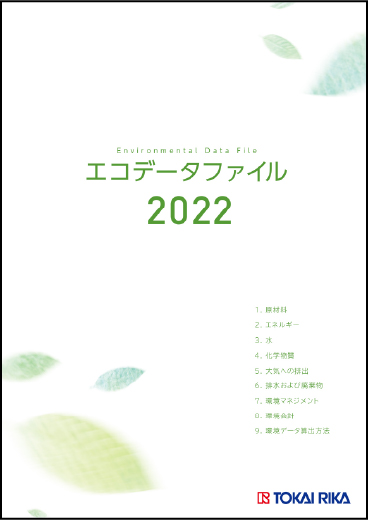Environmental Management
Positioning environmental preservation as an important challenge in management, the Tokai Rika Group establishes an Environmental Action Plan that constitutes our mid-term action plan every five years, and we are developing activities based on the environmental policy.
Enhancing and promoting consolidated environmental management
Promotion system
Environmental conservation activity policies, medium- to long-term targets, and responses to important issues are deliberated and decided by the Company-wide Environment Committee, which is chaired by the president. Under the Company-wide Environmental Committee, there are the Production Environment Committee, Product Environment Committee, and Green Procurement Committee. Furthermore, from fiscal 2021, we established a Carbon Neutral Strategy WG to promote cross-company projects based on prompt decision-making by a study group that includes the president.

Introduction of Internal Carbon Pricing system
We have introduced Internal Carbon Pricing (ICP)* to promote capital investment that can contribute to the reduction of CO2 emissions. By setting an in-house carbon price and evaluating the economic effect of CO2 reduction as an investment effect, carbon-neutral strategy investment can be promoted. The introduction of ICP makes it possible to visualize the economic impact of CO2 emissions, leading to appropriate investment decisions.
<Outline of our ICP system>
In-house carbon price:16,000 [yen/t-2]
System target :Carbon-neutral strategic investment
Application method :Calculate the cost by applying the in-house carbon price to the CO2 emissions associated with the target capital investment plan and use it as a reference for investment decisions.
Establishment and implementation of an environmental management system
 In order to continuously improve environmental ■ Situation regarding acquisition of EMS external certification at production bases performance, we are setting up Environmental Management Systems (EMS) in each base and acquiring external certifications. Tokai Rika and overseas production bases have acquired ISO14001 certification, and domestic group companies have acquired the Eco Action 21 certification in addition to the ISO14001.
In order to continuously improve environmental ■ Situation regarding acquisition of EMS external certification at production bases performance, we are setting up Environmental Management Systems (EMS) in each base and acquiring external certifications. Tokai Rika and overseas production bases have acquired ISO14001 certification, and domestic group companies have acquired the Eco Action 21 certification in addition to the ISO14001.
Reduction of environmental risks
 We evaluate environmental risks regarding production equipment and work done on our premises, conduct practical drills periodically for anticipated emergencies, and confirm that materials and response procedures function effectively. In FY 2021, there were no environmental abnormalities or complaints.
We evaluate environmental risks regarding production equipment and work done on our premises, conduct practical drills periodically for anticipated emergencies, and confirm that materials and response procedures function effectively. In FY 2021, there were no environmental abnormalities or complaints.
Promotion of environmental activities in cooperation with business partners
Cooperation with Suppliers
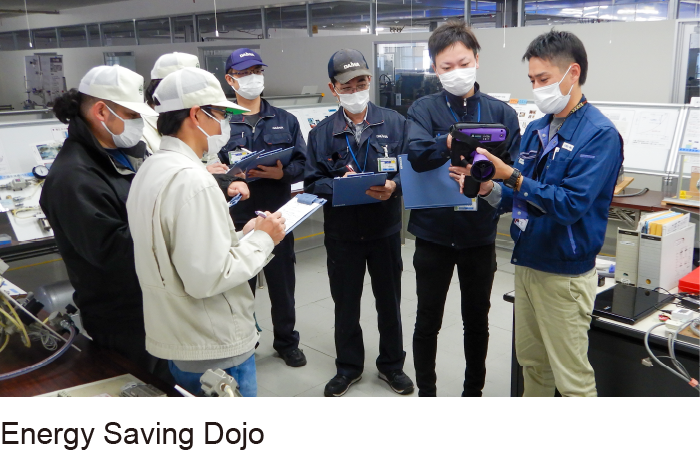
Support for Suppliers buy Energy Saving Dojo
We will make the "Energy Saving Dojo", an opportunity for training key energy-saving personnel in the company, available to our suppliers to pass on our energy saving know-how. We will work together to achieve carbon neutrality throughout our supply chain.
Cooperation with industry groups
Japan Auto Parts Industries Association
Our company is a member of the Japan Auto Parts Industries Association. In order to achieve the Voluntary Environmental Action Plan established to promote the creation of an Earth-friendly environment, we are working with member companies on measures to prevent global warming, including the reduction of CO2 emissions. We are also working to build a recycling promotion system throughout the entire automobile industry.
EPOC (Environmental Partnership Organizing Club)
We belong to the EPOC's Resource Circulation Subcommittee, which is mainly active in the industrial world in the Chubu region; we also participate as operational staff. EPOC conducts research, exchanges, practices, and information exchanges related to activities for reducing environmental load, transcending the boundaries of industries and business categories.
Human Resource Development
Environmental education
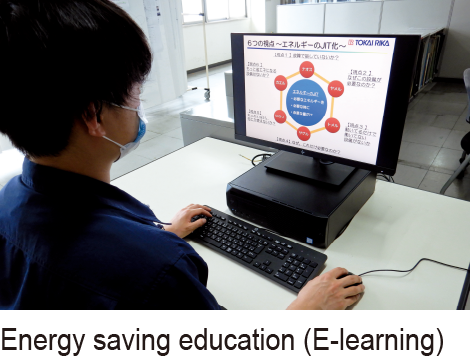
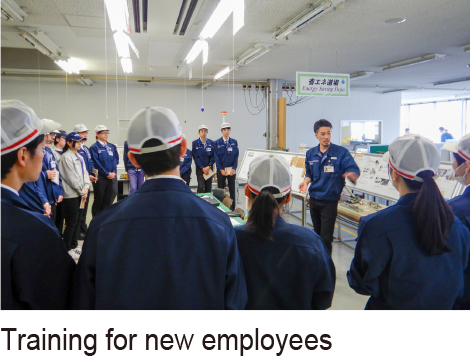
Awareness activities
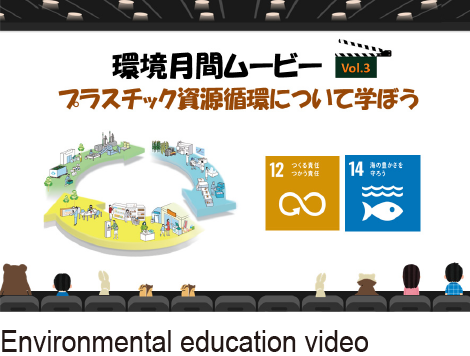
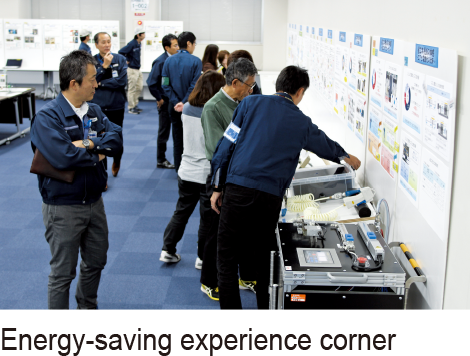
Disclosure of environmental information
In response to the growing interest in our non-financial information, we are actively promoting the disclosure of information related to the environment, while working to further enhance communication with stakeholders.
environmental data
It includes data on raw materials and energy, water and wastewater, air emissions, and waste with reference to the GRI Sustainability Reporting Standards 2016.
Correspondence to evaluation organizations
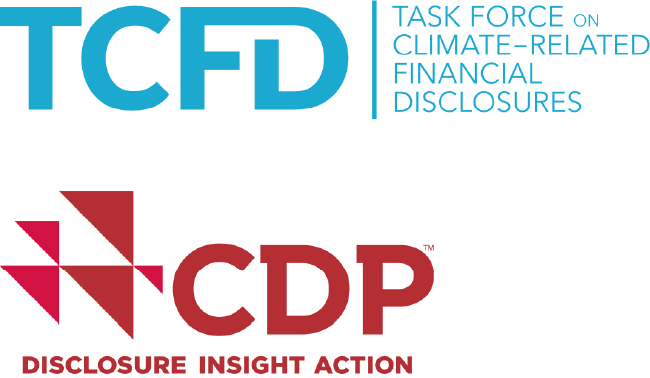 In April 2021, we announced our support for the TCFD (Task Force on Climate-Related Financial Information Disclosures)* proposal. In addition, we responded to the survey on ‘‘Climate Change’’ and ‘‘Water Security’’ conducted by CDP, an environmental NGO, and received a B rank in FY 2021.
In April 2021, we announced our support for the TCFD (Task Force on Climate-Related Financial Information Disclosures)* proposal. In addition, we responded to the survey on ‘‘Climate Change’’ and ‘‘Water Security’’ conducted by CDP, an environmental NGO, and received a B rank in FY 2021.
Detailed environmental data is published in an Eco Data File and on our website, and we will continue to disclose related information along with measures for carbon neutrality.
*Organization that requires disclosure of financial information on corporate initiatives and impacts on climate change
Input resources and emissions to the environment in business activities
We comprehensively understand the energy and resources used in our business activities, as well as the CO₂ emissions and waste generated, and are working to reduce our environmental load.

Environmental accounting
We understand the costs and effects of environmental conservation, and use it as an index to promote more rational environmental conservation activities.



Approach to environmental accounting
Environmental costs are determined and aggregated on an accrual and payment basis. Therefore, capital investment is recognized as an investment amount, and depreciation expenses are not recorded. Costs that are implemented in conjunction with non-environmental purposes are recorded on a proportional basis. The economic effects associated with environmental preservation activities are tabulated for each fiscal year using three items that allow us to accurately ascertain the amount of costs.


